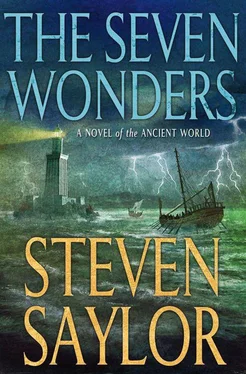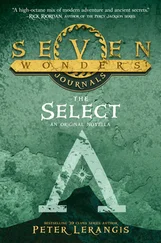Steven Saylor - The Seven Wonders
Здесь есть возможность читать онлайн «Steven Saylor - The Seven Wonders» весь текст электронной книги совершенно бесплатно (целиком полную версию без сокращений). В некоторых случаях можно слушать аудио, скачать через торрент в формате fb2 и присутствует краткое содержание. Год выпуска: 2012, Издательство: Macmillan, Жанр: Исторический детектив, на английском языке. Описание произведения, (предисловие) а так же отзывы посетителей доступны на портале библиотеки ЛибКат.
- Название:The Seven Wonders
- Автор:
- Издательство:Macmillan
- Жанр:
- Год:2012
- ISBN:нет данных
- Рейтинг книги:4 / 5. Голосов: 1
-
Избранное:Добавить в избранное
- Отзывы:
-
Ваша оценка:
- 80
- 1
- 2
- 3
- 4
- 5
The Seven Wonders: краткое содержание, описание и аннотация
Предлагаем к чтению аннотацию, описание, краткое содержание или предисловие (зависит от того, что написал сам автор книги «The Seven Wonders»). Если вы не нашли необходимую информацию о книге — напишите в комментариях, мы постараемся отыскать её.
The Seven Wonders — читать онлайн бесплатно полную книгу (весь текст) целиком
Ниже представлен текст книги, разбитый по страницам. Система сохранения места последней прочитанной страницы, позволяет с удобством читать онлайн бесплатно книгу «The Seven Wonders», без необходимости каждый раз заново искать на чём Вы остановились. Поставьте закладку, и сможете в любой момент перейти на страницу, на которой закончили чтение.
Интервал:
Закладка:
Protophanes shook his head. Politics did not interest him. “Well, I just wanted to say hello, and thank you for catching that snake. If they had a contest for quick reflexes, you’d be a hard one to beat, Gordianus! When I win the pankration, I won’t forget you.”
Protophanes walked away. Antipater sighed. “What a pleasant young fellow. I do hope he wins.”
“At least he had the manners to thank me,” I said.
“Well, then, before the afternoon events, shall we return to our quarters for a bite to eat?”
“What! Surely you don’t intend to spend any more time in the pavilion of Exagentus, Teacher.”
“And why not?”
“Because the man’s a killer! Or as good as.”
“Why do you say that, Gordianus?”
“Because of what I overheard last night.”
“You say you overheard the blond man insisting that ‘the Sidonian’ be killed-you thought he meant me, but as you later realized, he actually meant Simmius. But if I understand you correctly, you didn’t clearly hear the other speaker-who may or may not have been our host, and who, if anything, seemed to be disagreeing with the killer.”
“True enough,” I said. “But someone in that pavilion is most certainly in league with Mithridates. ‘He’s liable to expose us as agents of Mithridates’-that’s what the man with the snake said.”
“Even so, what have we to fear from such a person?”
“I exposed the killer! I may have ruined whatever plot they were hatching. What if they mean to take revenge?”
Antipater smiled. “Gordianus, you exposed an assassin. Assassins are expendable. If you fear that you’ve made yourself a target for retribution by the King of Pontus, I think you’re letting your imagination run away with you. Now, let us return to the pavilion. If our host is there, I shall introduce you. Exagentus is quite a nice fellow, I assure you. And he’s justly famous for laying a sumptuous table. I don’t know about you, but this morning’s events have given me quite an appetite.”
* * *
Of the numerous events we attended over the five days of the Olympiad, my memories are all a blur. There were footraces, chariot races, and horse races, as well as the race of hoplites in armor, a cumbersome, clanking affair that struck me as more comical than fearsome. There was something called the pentathlon, which involved throwing a discus and a javelin as well as jumping and running and wrestling. It made me tired just to watch it. Among the final events were the man-to-man combats of wrestling, boxing, and the brutal pankration. Besides these official events, there were exhibition contests for boys not yet old enough to compete, and in the evenings a great deal of drinking and feasting, including the slaughter of a hundred oxen at the Great Altar of Zeus in front of his temple.
Antipater insisted on attending every event, and enjoyed them all immensely. His delight in the pankration struck me as particularly ironic. Here was a man who had devoted his life to the crafting of beautiful verses, striving to capture in words the most delicate sensibilities and elusive states of mind, reduced to a screaming, stamping, bellowing maniac along with his fellow Greeks at the spectacle of two men grappling in the dirt, pummeling each other’s faces with their fists, and gouging each other’s most tender parts. The pankration even allowed choking, and during one of Protophanes’ early bouts, I thought we were about to see him strangle his opponent to death before our very eyes. The sight of the poor fellow’s bright red face, protruding tongue, and bulging eyes caused tears of joy to run down Antipater’s cheeks. The loser barely managed to lift his finger to signal submission before he fainted dead away.
Seeing Antipater’s behavior at the Olympiad, I realized that, though I had known him most of my life, in some ways my old teacher was still a mystery to me.
When all the punching, poking, bone crunching, arm bending, and general mayhem was finally over, Protophanes emerged victorious in the pankration. His face was bloody, one eye was swollen shut, and his whole body was covered with scrapes and bruises, but his grin was brighter than ever as he accepted his victor’s wreath-his second of the Games, for not only did he win the pankration, but the wrestling competition as well, a feat that thrilled Antipater.
“Hercules was the first to win both wrestling and pankration,” he gushed, “and in all the hundreds of years since then, only three others have done the same. Now Protophanes is the fourth. His fame shall outlast us all!”
“Even the fame of Antipater of Sidon, Teacher?”
Antipater sighed. “What is the achievement of a mere poet, compared to that of an Olympic victor?”
To his credit, Protophanes was gracious in victory. After the closing ceremonies, and the procession in which the victors were showered with leaves, he sought me out in the crowd.
“Gordianus! What did you think of the Games?”
“Grueling,” I said.
“Indeed! But to those of us who win, it’s worth all the effort.”
“I’m sure. But may I be candid? The so-called spirit of the Games eludes me. Such a fuss is made about the ideals of sportsmanship, discipline, piety, and fair play, yet the contests themselves seem to me sweaty, hectic, brutish, and violent. What’s touted as a gathering in honor of sport simmers just beneath the surface with politics and intrigue; we even witnessed a murder! And the unspoken tension between Greek pride and Roman hegemony casts a shadow over everything. It makes me wonder about the times we live in, and the customs men live by-‘ O tempora! O mores! ’ as my father says in our native Latin.”
Protophanes looked at me blankly. Somewhere along the way I had lost him.
“I suppose you’ll be off to the victors’ banquet now,” said Antipater, sighing at the thought of all the winners gathered in one place.
“Yes, and what a feast it’s going to be! But before I go, I wanted to settle a debt.”
“A debt?” I said.
“To you, Gordianus. If they’d blamed me for the Cynic’s death, I’d never have been allowed to take the oath. You took care of that! The city fathers of Magnesia have promised to be very generous to me-doubly generous, since I’ll be taking home not one but two Olympic wreaths.” He held forth a leather pouch. “This is all the money I brought with me, but I won’t be needing it now-rich men will be fighting each other to provide my lodging and to pay for my dinners all the way home. So I want you to have it.”
He pressed the money bag into my hands. It felt quite heavy.
“But I couldn’t-”
“Don’t be modest, Gordianus. Cynicism gets a man nowhere in this life-and neither does modesty. But if you take my advice, you’ll donate whatever portion you can afford to the Temple of Zeus. It’s Zeus who makes all things possible. Zeus gave me victory, and I have no doubt it was Zeus who opened your eyes to the truth about the Cynic’s death. Now I must be off. Safe journeys to you! If you should ever get to Magnesia, look me up.”
“What a fellow!” whispered Antipater, watching him depart. “And what a windfall for you, Gordianus. You should heed his advice, and donate every drachma to Zeus.”
I frowned. “A good part of it, perhaps, but not every drachma, surely.”
“But what would you spend it on? I’ve seen you in the market. You care nothing for all the trinkets and souvenirs for sale.”
“I did see a couple of desirable items,” I said, remembering the blond and brunette who had sauntered by on our first day, as tall as Amazons and wearing chitons no more substantial than a spider’s web. I wondered if they were still in Olympia.
V
Интервал:
Закладка:
Похожие книги на «The Seven Wonders»
Представляем Вашему вниманию похожие книги на «The Seven Wonders» списком для выбора. Мы отобрали схожую по названию и смыслу литературу в надежде предоставить читателям больше вариантов отыскать новые, интересные, ещё непрочитанные произведения.
Обсуждение, отзывы о книге «The Seven Wonders» и просто собственные мнения читателей. Оставьте ваши комментарии, напишите, что Вы думаете о произведении, его смысле или главных героях. Укажите что конкретно понравилось, а что нет, и почему Вы так считаете.










